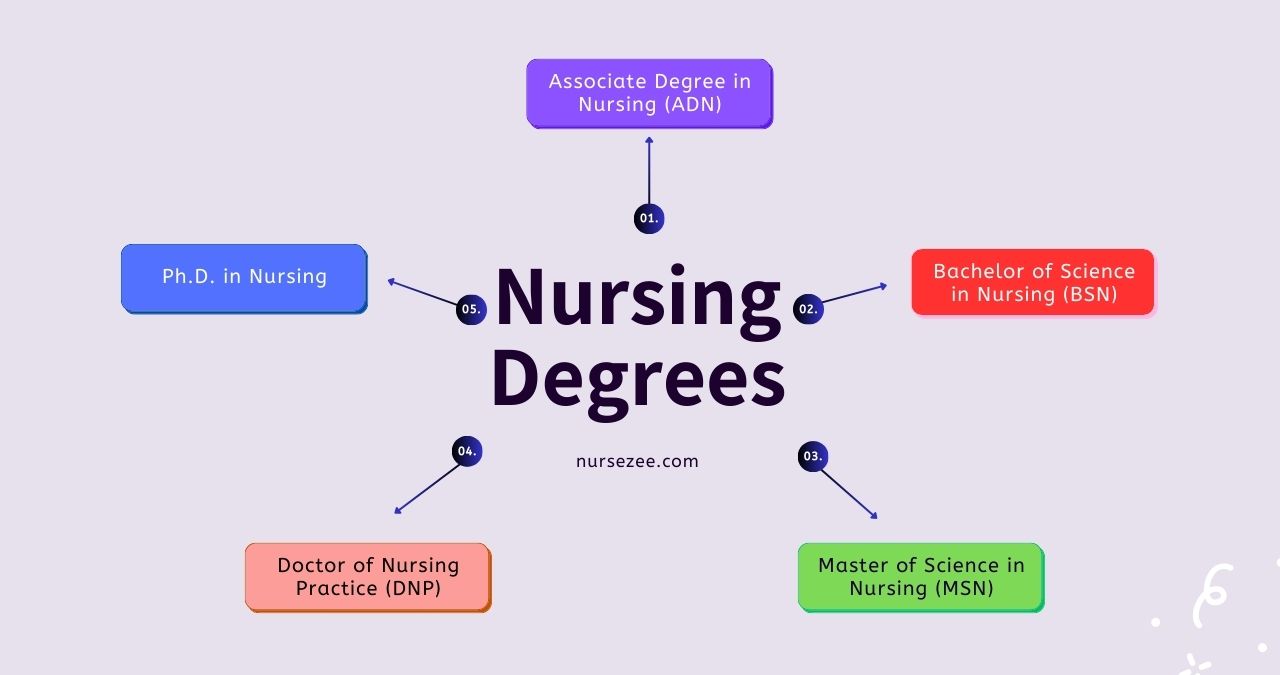
Understanding Different Nursing Degrees
Nursing EducationThe field of nursing offers a wide range of educational pathways, each designed to equip nurses with varying levels of expertise and specialization. Whether you’re just starting your nursing career or looking to advance your education, understanding the differences between nursing degrees is crucial to choosing the right path for your goals. This guide breaks down the key aspects of Associate Degrees in Nursing (ADN), Bachelor of Science in Nursing (BSN), Master of Science in Nursing (MSN), Doctor of Nursing Practice (DNP), and Ph.D. in Nursing.
1. Associate Degree in Nursing (ADN)
Overview:
An ADN is typically a two-year program offered by community colleges. It’s an entry-level degree that prepares students to become Registered Nurses (RNs).
Key Features:
- Duration: 2 years.
- Curriculum: Focuses on foundational nursing skills, patient care, and clinical practice.
- Career Opportunities: Graduates are eligible to take the NCLEX-RN exam and work as RNs in hospitals, clinics, or long-term care facilities.
- Advantages: Lower cost and shorter duration compared to a BSN.
Ideal For:
Those looking for a fast-track option to start their nursing career.
2. Bachelor of Science in Nursing (BSN)
Overview:
A BSN is a four-year degree offered by colleges and universities. It provides more comprehensive training than an ADN and includes leadership, research, and public health courses.
Key Features:
- Duration: 4 years (or 1–2 years for those with an ADN through RN-to-BSN programs).
- Curriculum: Includes advanced coursework in nursing theory, management, and specialized patient care.
- Career Opportunities: BSN graduates often have access to higher-paying roles and are preferred for positions in hospitals and other healthcare settings.
- Advantages: Prepares students for graduate-level education and advanced roles like Nurse Manager or Public Health Nurse.
Ideal For:
Students aiming for long-term growth and leadership opportunities in nursing.
3. Master of Science in Nursing (MSN)
Overview:
An MSN is a graduate degree that allows nurses to specialize in advanced practice roles or focus on areas like education, research, or administration.
Key Features:
- Duration: 1.5–3 years, depending on the program and prior education.
- Specializations: Includes Nurse Practitioner (NP), Clinical Nurse Specialist (CNS), Nurse Educator, and Nurse Administrator.
- Career Opportunities: Advanced practice roles, teaching positions, and leadership roles in healthcare organizations.
- Advantages: Higher earning potential and the ability to make a broader impact in healthcare.
Ideal For:
RNs with a BSN looking to advance their careers or specialize in a specific area.
4. Doctor of Nursing Practice (DNP)
Overview:
The DNP is a terminal degree focused on clinical practice. It’s designed for nurses who want to lead in advanced clinical settings or influence healthcare policies.
Key Features:
- Duration: 2–4 years, depending on prior education.
- Curriculum: Emphasizes clinical practice, healthcare systems, and leadership.
- Career Opportunities: Leadership roles, advanced practice positions, and healthcare policy development.
- Advantages: Positions nurses as clinical experts and leaders in the healthcare field.
Ideal For:
Those seeking the highest level of clinical expertise and leadership opportunities.
5. Ph.D. in Nursing
Overview:
A Ph.D. in Nursing is a research-focused terminal degree. It’s ideal for nurses interested in advancing the science of nursing through research and academia.
Key Features:
- Duration: 3–5 years, depending on the program and pace of study.
- Curriculum: Focuses on research methods, theory development, and scholarly inquiry.
- Career Opportunities: Academic positions, research roles, and contributions to healthcare innovations.
- Advantages: Opportunities to impact the nursing profession through groundbreaking research and education.
Ideal For:
Nurses passionate about research, teaching, and advancing nursing science.
Choosing the Right Path
Your choice of nursing degree depends on your career goals, time commitment, and interests.
- Start with an ADN for a quicker entry into the nursing field.
- Opt for a BSN if you’re looking for broader career opportunities and long-term growth.
- Pursue an MSN if you want to specialize in a specific area or advance into leadership.
- Consider a DNP or Ph.D. if you aim to reach the pinnacle of clinical practice or research.
Career and Growth Opportunities
The demand for nurses continues to grow, and advanced degrees can open doors to specialized roles, higher salaries, and leadership positions. According to the U.S. Bureau of Labor Statistics, employment of registered nurses is projected to grow 6% from 2022 to 2032, and advanced practice roles like Nurse Practitioners are expected to grow by 40% during the same period.
Final Thoughts
Understanding the different nursing degrees empowers you to choose the educational path that aligns with your aspirations. Whether you’re just starting or looking to advance, each degree offers unique opportunities to make a meaningful impact in healthcare.



